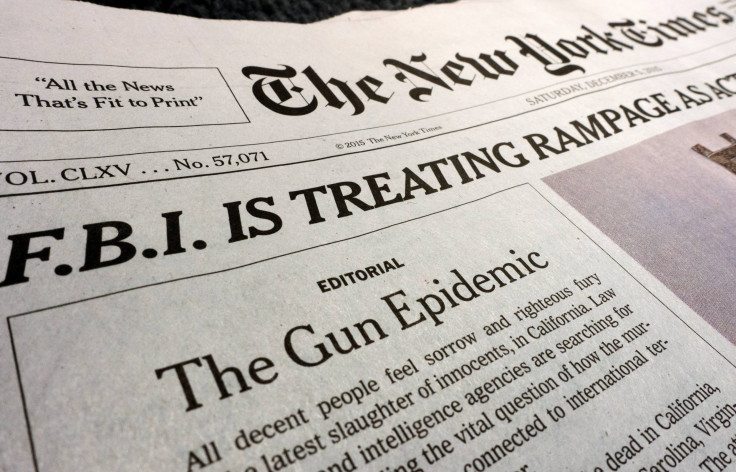Big Correction For New York Times: FBI Says San Bernardino Facebook Report Was Botched

The New York Times issued a massive correction Thursday on a front-page article from Sunday reporting that San Bernardino shooters Tashfeen Malik and Syed Farook openly posted support for violent jihad on social media platforms such as "Facebook and Twitter." In an editor's note, the paper of record acknowledged that FBI Director James Comey had publicly denied the claims of the article in a news conference in New York.
The correction is a giant comedown from a screamer scoop that dictated the conversation on national security for the entire week, including flights of fancy from Republican presidential candidates during CNN's Las Vegas debate on Tuesday. On Monday, the U.S. Department of Homeland Security announced it would begin screening social media posts of visa applicants trying to enter the United States.
"The original version of this article, based on accounts from law enforcement officials, reported that Tashfeen Malik had 'talked openly on social media' about her support for violent jihad," the Times editor's note read. "On Wednesday, however, the FBI director, James B. Comey, said that online communications about jihad by Ms. Malik and her husband, Syed Rizwan Farook, involved 'direct, private messages.'"
"His remarks indicated that the comments about jihad were not made in widely accessible social media posts," the paper went on. "Law enforcement officials subsequently told the Times that Ms. Malik communicated with her husband in emails and private messages, and on a dating site."
Two of the story's authors, Matt Apuzzo and Michael Schmidt, are among the Times' most respected investigative reporters -- Apuzzo won a Pulitizer in 2012 while working at the Associated Press, while Schmidt distinguished himself with ace reporting at the Times about steroid use in professional sports, breaking news on the drug use of Barry Bonds, Manny Ramirez, Sammy Sosa and David Ortiz.
But they're also the same team that earlier this year botched a report, another exclusive front-pager, which erroneously claimed that Hillary Clinton was under criminal investigation. The inquiry was, in fact, simply a referral of documents recently released under the Freedom of Information Act concerning Clinton's emails.
"Rushing to publish a scoop, the Times failed to make sure that the story was correct, and hurt its reputation for authoritative accuracy -- precisely what its most loyal readers count on," wrote the paper's public editor (in-house watchdog), Margaret Sullivan, after the article was discovered to be wrong. Like the Malik report, it was based on anonymous government sources, which in this case turned a general inquiry into a sensational takedown of the former secretary of state and current Democratic presidential front-runner.
To make matters messier, once the Times got wind of its error, the story was altered without any correction. Hours after the would-be blockbuster article went live, the Times removed the language of “criminal inquiry" and instead referred to the hubbub as a “security” referral. A correction didn't appear until much later.
“We should have explained to our readers right away what happened here, as soon as we knew it,” executive editor Dean Baquet said later. "That could have been in an editor’s note or in a story, or in some other form."
That appears to be the approach taken this time around. Still, it's another blemish for the Times investigative duo of Apuzzo and Schmidt.
© Copyright IBTimes 2024. All rights reserved.












